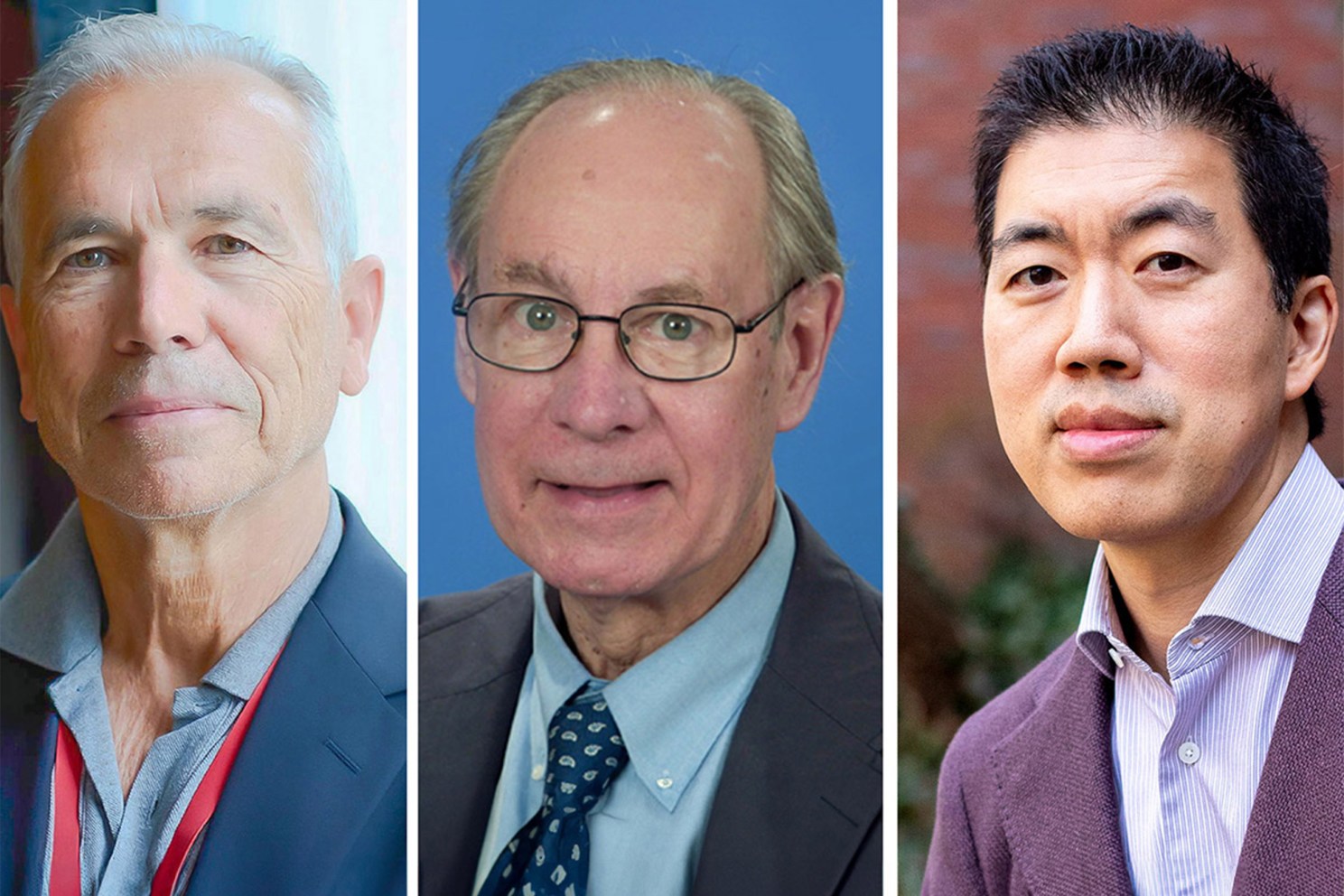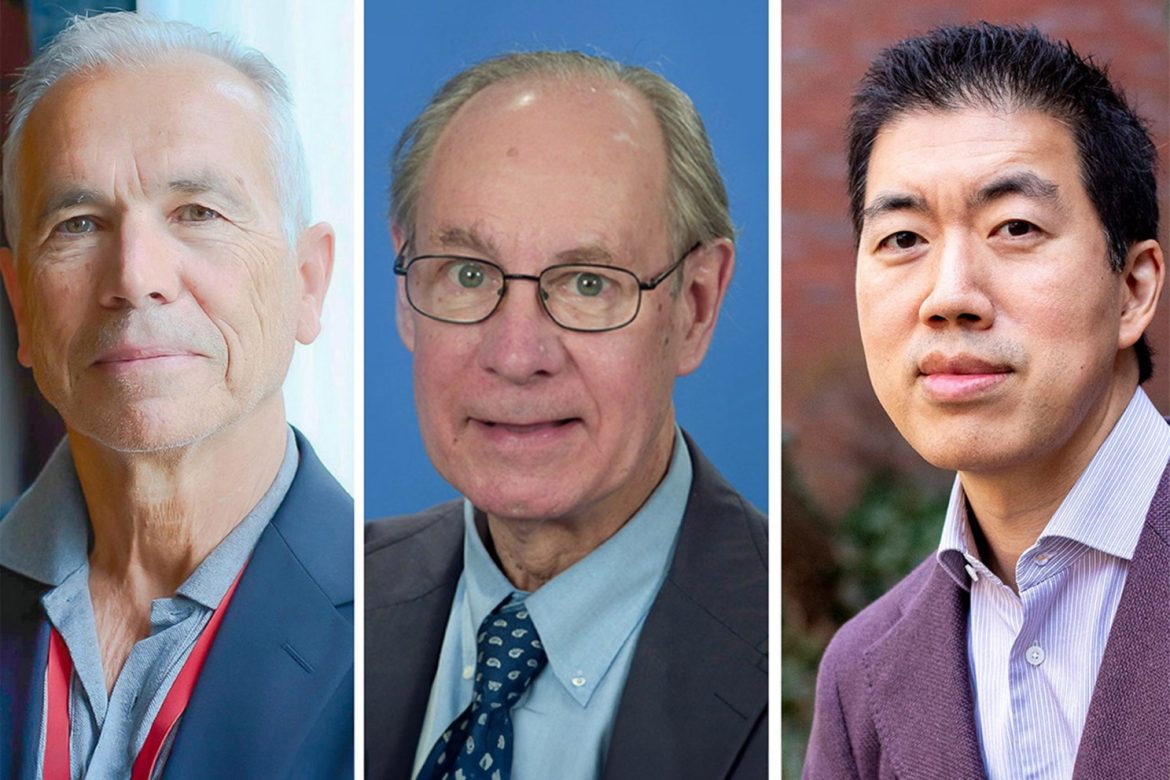
Alberto Ascherio, Joel Habener, and David Liu.
Photos courtesy of Alberto Ascherio and Joel Habener, photo by Veasey Conway/Harvard Staff Photographer
Health
Harvard researchers awarded Breakthrough Prizes
‘Oscars of Science’ recognize advances in gene editing and physics and against MS, obesity
Three Harvard researchers received 2025 Breakthrough Prizes — the “Oscars of Science” — on Saturday. Also recognized was the ATLAS general-purpose particle physics experiment at CERN, to which Harvard faculty, researchers, and students have made significant contributions.
The Breakthrough Prize, founded in 2013 by Sergey Brin, Priscilla Chan and Mark Zuckerberg, Yuri and Julia Milner, and Anne Wojcicki, honors achievements in life sciences, fundamental physics, and mathematics.
Six prizes were announced. The Harvard recipients are:
Alberto Ascherio, a professor of epidemiology and nutrition at the Harvard T.H. Chan School of Public Health and a professor of medicine at Harvard Medical School, was recognized for work establishing Epstein-Barr virus infection as leading cause of multiple sclerosis.
MS is a chronic inflammatory disease of the central nervous system that affects about 2.9 million people worldwide and currently has no cure. Epstein-Barr is a herpes virus that can cause mononucleosis and establishes a lifelong latent infection.
Although there was no single eureka moment in Ascherio’s more than 25-year effort to identify the cause of multiple sclerosis, the results of his 2022 Science study were undoubtedly dramatic. Using data from more than 10 million U.S. soldiers monitored over a 20-year period, Ascherio and his colleagues found that infection with the Epstein-Barr virus significantly increased the risk of developing multiple sclerosis later in life — the first compelling evidence of a cause for this devastating disease.
The discovery revolutionized the field of MS research, and a vaccine and antibody drugs that target Epstein-Barr are now in development. “It’s virtually a consensus now that Epstein-Barr is the leading cause of MS,” Ascherio said. “I’m happy to say that finally, after 25 years, it’s been a big splash.”
Read more about Ascherio and the MS/Epstein-Barr research here.
Joel Habener, a professor at Harvard Medical School, was part of a group of scientists honored for contributions to the discovery and characterization of the hormone glucagon-like peptide-1, or GLP-1 — findings that subsequently led to the development of treatments based on GLP-1.
GLP-1 is a hormone produced by the small intestine that plays a key role in regulating blood sugar, controlling appetite, and modulating digestion. To coordinate these complicated tasks, the hormone must simultaneously communicate with other hormones and with multiple organs and systems, including the stomach, pancreas, liver, brain, heart, blood vessels, and immune system.
The body of research conducted by the five scientists, supported in part by federal funding, has dramatically advanced understanding of how GLP-1 functions in the body. Notably, their work contributed to the development of GLP-1 drugs, which have revolutionized treatment for Type 2 diabetes and obesity.
Read more about Habener and the GLP-1 research here.
David Liu — the Richard Merkin Professor at the Broad Institute, director of the institute’s Merkin Institute for Transformative Technologies in Healthcare, and the Thomas Dudley Cabot Professor of the Natural Sciences at Harvard — was honored for the development of the gene editing platforms base editing and prime editing, which can correct the vast majority of known disease-causing genetic variations and have already been used in at least 15 clinical trials, with life-saving results. Base editing was recently used to achieve the first-ever correction of a disease-causing mutation in patients.
Base editing, which Liu’s team developed in 2016, is a gene editing technique that directly converts an individual DNA base pair into a different base pair. Prime editing, which Liu’s group pioneered three years later, can make insertions, deletions, and substitutions up to hundreds of base pairs long in the genome.
Since their initial development, both base editing and prime editing have been used by thousands of laboratories around the world and have enabled the study and potential treatment of many genetic diseases.
“The real heroes behind our work are the incredibly talented graduate students, postdocs, and collaborators who worked tirelessly to develop these technologies in ways that would allow them to benefit society,” said Liu. “Without their dedication, this work would not be possible. The honor of my professional life is to be able to work with and support such a vibrant group of scientists.”
Read more about Liu and the gene editing research here.
Three Harvard faculty in the Physics Department as well as several students and researchers were recognized with the Breakthrough Prize in Fundamental Physics for their work on the ATLAS collaboration. The team of 13,000 physicists, engineers, and technicians conducts general-purpose particle physics experiments at the Large Hadron Collider at CERN. Harvard members of ATLAS include Melissa Franklin, Mallinkrodt Professor of Physics; Masahiro Morii, Donner Professor of Science; John Huth, Donner Professor of Science; postdocs Rongkun Wang, Aaron White, Knut Koch, and Simone Francescato; and Harvard Griffin GSAS students Gustavo Kehris, Laura Bruce, Kees Bekendorfer, Jerry Ling, and Alexis Mulski.

